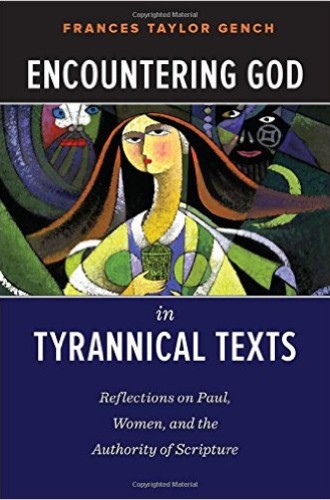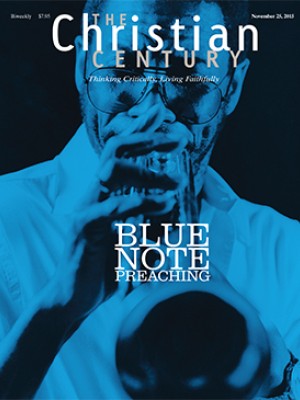Wrestling with Paul
Frances Taylor Gench, professor of biblical interpretation at Union Presbyterian Seminary, tackles a conundrum: “The Bible is a profoundly liberating document” that contains “deeply problematic texts” which have “legitimated the right of some to exercise unjust power or control over others.” How then are we to read faithfully and canonically without turning a blind eye to forms of oppression legitimated by the text? Can we wrest redemption out of these threatening passages?
Invoking the Genesis account of Jacob wrestling an angel at the river Jabbok, Gench commends the advice of biblical scholar Phyllis Trible, “Do not abandon the Bible to the bashers and the thumpers. Take back the text. Do not let go until it blesses you.” Here Gench wrestles with six controversial texts concerning women that were written by or have been attributed to the apostle Paul. She shows that not only are these texts capable of inflicting deep and lasting wounds, but, in the hands of tyrannous interpreters, they do indeed cause such harm.
Read our latest issue or browse back issues.
These are the texts that some of us pray will not come up in the lectionary; they are the ones we teachers tend to avoid placing on the course syllabus. In her unflinching self-reflection (a strong point of the book), Gench confesses having the impulse to take scissors to the offending lines. She relies on a certain empathy with this impulse from the reader, an empathy that requires both a serious commitment to the text—to what feminist theologian Letty Russell called “the story of God’s love affair with the world”—and discomfort with its undeniably patriarchal context and its mixed messages of liberation and subordination, especially where women are concerned.
Gench elects to wrestle with these texts rather than ignore or remove them because she is committed to the Bible as scripture. She follows Ellen Davis’s cardinal rule that “no biblical text may be safely repudiated as a source of edification for the church” as she sets out an interpretive strategy suited to the peculiar challenges offered by these six passages: 1 Timothy 2:8–15; Ephesians 5:21–33; 1 Corinthians 11:2–16; 1 Corinthians 14:33b–36; 1 Timothy 5:3–16, and Romans 16:1–16.
Five recommendations guide Gench’s argument. These are at the heart of her method and the key to its pastoral and critical success: 1) remember that the difficult text is worthy of charity from its interpreters; 2) argue with the text, confident that wrestling with scripture is an act of faithfulness; 3) resist the temptation to throw the baby out with the bathwater; 4) learn from the dangers as well as the insights that biblical texts present; 5) don’t let anyone tell you that you are not taking the authority of the Bible seriously. These recommendations are themselves grounded in ancient principles of interpretation embraced by Reformed theology: scripture is interpreted by scripture; Christ is central; the Rule of Faith and the Rule of Love work together to form communities over time as the body of Christ.
What is perhaps most admirable about Gench’s strategy is her clear-sighted acknowledgment that biblical tradition comprises a history of tensions produced as collectives of real human beings grapple with the theological novum of the Christ event. The present-day Christian who would be not only informed by scripture but formed “in the mind of Christ” will approach scripture with honesty and genuine courage, ready to hear its voices of conflict and discord and to let these stand unresolved by facile theological correctives. Such a reader will recognize that these texts preserve the sites of ancient controversies even as they point to a larger, more generous and liberating message, and that their unresolved tensions keep the reader ever open to repentance as metanoia, change of mind.
Current controversies and practices that stem from “tyrannical texts,” particularly patterns of subordination of women, are ever in view. Gench shows that biblical justifications for these patterns have remarkable resilience even as—perhaps especially as—cultural ground shifts toward more equal treatment of women. And yet, acting on the conviction that the church may find edification even in these passages, as everywhere in scripture, Gench reveals for each text a fresh path through the thicket of dangers. Often this means showing its place within a larger context of imperatives generated by the love command.
So, for example, Gench advises that we “consider interpreting Ephesians by Ephesians, for elsewhere in this epistle it appears that practices of subordination and love are binding on all members of Christ’s body, male and female (4:1–3, 5, 15–16; 5:1–2).” Here Gench is willing to place the troubling subordination clauses in Ephesians 5 under the judgment of the canon’s, and even Ephesians’ own, love command. Perhaps, as she intimates more than once in the book, the author of a particular letter (Paul or his follower) is wrestling with the radical singularity of the lordship of Christ against every human hierarchy. Perhaps the blessing of that lordship, not yet fully revealed to the author in his patriarchal age, is for us to discover as we genuinely converse with him, diligently sensitive to his time and place.
In a text more widely held to be Paul’s authentic writing, 1 Corinthians 11:2–16, the vexed issue of head coverings reveals, again, a clash of cultural practices with the theological novum of equality in Christ. Gench deftly guides her reader through a host of scholarly opinions on the text, then enters into an imaginative conversation with Paul and the Corinthian women, writing letters of her own to each. The result is not a resolution of the matter but a recognition that the situation reflects both the vibrant presence of women in leadership and the perhaps inevitable cultural and theological controversies their spiritual gifts provoked.
Gench ends her study with the last chapter of Romans, a text that is not tyrannous but rather an antidote to tyranny—and hence is an edifying example of scripture interpreting scripture. In it Paul lists ten women as colleagues in ministry, among them the deacon Phoebe, who carries the letter to Rome, and the apostle Junia; both of these titles are provided by Paul.
Gench’s book is well informed, free of jargon, clear in method, and enhanced by helpful discussion questions at each chapter’s end. Some readers may find it churchy in an occasionally off-putting way—for example, in the repeated refrain, “As you read it, listen for what the Spirit is saying to the church.” Others may wish for deeper coverage of the ways in which certain newer readings of Paul, such as the apocalyptic and new perspective readings, might address the questions Gench puts before us. Some may be unconvinced by the founding premise that “no biblical text may be safely repudiated as a source of edification for the church.” But every reader who takes the book seriously will understand that Gench is engaging, heart and mind, in a “holy wrestling.” And many will be emboldened to take up texts that had, for them, carried only bad news before—and to hold on, striving faithfully for the blessing of the gospel.







